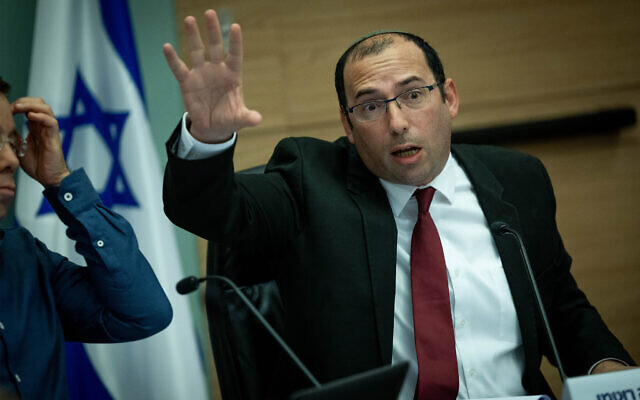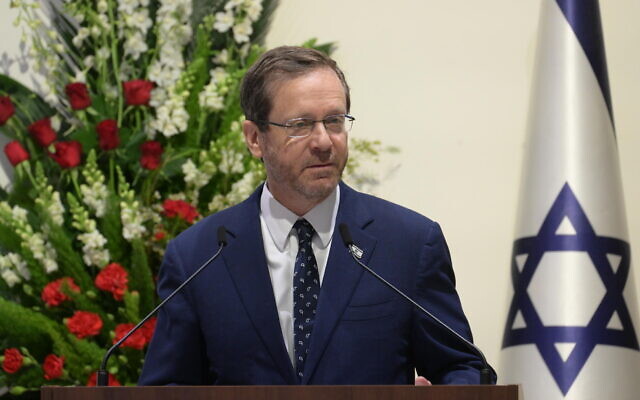Rothman readies bill to greatly limit judicial review for Knesset committee hearing
Amendment to Basic Law barring the use of ‘reasonableness’ expected to come before panel next week; MK Gideon Sa’ar calls wording ‘very, very extreme and very, very dangerous’
Jeremy Sharon is The Times of Israel’s legal affairs and settlements reporter

Religious Zionism MK Simcha Rothman, the chair of the Knesset Constitution, Law and Justice committee, made public on Tuesday the text of a bill that would severely limit judicial review of government decisions.
According to the text of the bill — presented as an amendment to the existing Basic Law: The Judiciary — the courts, including the High Court of Justice, would no longer be able to even hold hearings over the reasonableness of a decision, or invalidate decisions made by the prime minister, the cabinet, ministers, or other elected officials merely based on their “reasonableness.”
The legislation was set to come before a hearing of the Knesset Constitution, Law and Justice Committee as early as Wednesday, but the coalition announced late Tuesday that it was delaying the discussion to next week in the wake of the deadly terror attack at the Eli settlement. The coalition said this week that it wants to pass the amendment into law within the next six weeks, before the Knesset breaks for summer recess at the end of July.
Rothman and Justice Minister Yariv Levin — the key architects of the government’s judicial overhaul plan — have argued that use of the reasonableness test, which allows the courts to judge whether the considerations behind a government or ministerial decision were assigned the proper weight, gives the High Court far too wide a scope to intervene in decisions that should be the purview of the government and elected officials.
Earlier this year, the High Court of Justice ruled that Shas leader Aryeh Deri’s appointment as the health and interior minister was “unreasonable in the extreme” due to his previous criminal convictions and his commitment to quit the Knesset as part of a plea bargain in 2022.
Prime Minister Benjamin Netanyahu at the time vowed to work toward legally returning Deri to the cabinet through his government’s judicial overhaul — though overturning the test of “reasonableness” would still leave other hurdles for Deri.

Opposition MK Gideon Sa’ar, a former justice minister, said Tuesday that he supports curtailing the test of “reasonableness” when it comes to evaluating policy decisions made by the government, but not when ruling on political appointments.
“When it comes to policy decisions, the court does not have additional weight, additional knowledge or additional ability to decide more than those who have been elected,” he told Kan public radio.
“But in issues of corrupt appointments, there is no reason, and it’s not for the good of the public, to limit the test of ‘reasonableness,'” Sa’ar added, noting that this was the opposition’s stance during the overhaul compromise talks at the President’s Residence.
The legislation submitted by Rothman, Sa’ar said, “is much broader, extending to any decision of any elected official,” including Knesset committees and municipal elections, “and I think it’s very, very extreme and very, very dangerous.”
Sa’ar said that the current wording is also “much more far-reaching than the position of the coalition representatives in the talks at the President’s Residence.”
The decision of the coalition to move ahead with legislation for parts of its judicial overhaul plan likely spell the end of the now-frozen talks hosted by President Isaac Herzog for the past three months to work toward a consensus solution.

Herzog released a statement on Monday calling on parties to return to the negotiating table, despite the red lines set and crossed among them.
“I have always believed, and today more than ever, that dialogue is the best solution for the State of Israel. I reiterate my call to show national responsibility and to continue the fruitful and substantive dialogue that took place in recent months under the auspices of the President’s Residence,” he said.
Carrie Keller-Lynn and Times of Israel staff contributed to this report.









